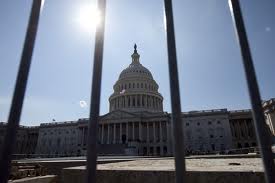Lights Are Out and Nobody’s Home
-Christopher Carroll
Dark days are coming. The lights may be turned off in Washington. Easy to forget in the recent Syria conflict turmoil is that America is once again hurtling toward fiscal disaster. For most Americans, it’s the same old story; more Washington ineptitude, more partisan bickering, more selfish nonsense and more political puffery.
Congress, due to return to Washington D.C shortly, is facing two major fiscal debates, reaching the debt limit and an impending government shutdown. The velocity with which these deadlines approach is going to put a great deal of pressure on Congress to act quickly, something they have not been known to do frequently.
Last week, the Obama administration announced that the Department of the Treasury will run out of money sooner than expected. Treasury Secretary Jack Lew has said that the Department expects to exhaust methods to postpone arriving at the limit in mid-October, putting it on schedule to immediately follow the other major fiscal fight, the funding of the federal government. Both of these fights are expected to be bloody, but having them back-to-back could make them fatal.
The fiscal debate will be a major battle. The Obama administration has said that the President will not entertain negotiation over the debt limit, insisting instead that the debt limit be raised to prevent default on previously accrued debts. “Such a scenario could undermine financial markets,” explained Lew, and could “result in significant disruptions to our economy.” Meanwhile, House Speaker John Boehner (R. – OH), expects a “whale of a fight” over the debt limit, hoping to leverage raising the borrowing limit so as to attain further budget cuts beyond what is known as the sequester.
 Even before the debt limit is reached, September 30th will bring the end of the current government’s funding. Unless a budget or continuing resolution is reached before the September 30th deadline, the government will no longer have the authority to remain operational.
Even before the debt limit is reached, September 30th will bring the end of the current government’s funding. Unless a budget or continuing resolution is reached before the September 30th deadline, the government will no longer have the authority to remain operational.
Similarly to their stance on the debt limit, House Republicans believe that the threat of a government shutdown provides political ammunition. Many plan to insist upon further budget cuts, to accompany those already in place by sequestration, or the gutting of the Affordable Care Act, in any budgetary deal. Many democrats want to replace sequestration in a new budget agreement, but Speaker Boehner and his caucus don’t seem to be remotely interested.
****
It is difficult to envision a way in which the Obama administration and House GOP come to an agreement on either of these issues. The administration insists that it will not negotiate with Congress on the debt limit while Speaker Boehner and Majority Leader Cantor plan on reaping concessions on taxes and healthcare. Meanwhile, it is just as hard to see the two sides agreeing on a comprehensive budget while Democrats want to replace the sequester, thereby easing the noose strangling the economy, while Republicans push for keeping the sequester and repeal of the ACA. Dark days seem to be fast approaching.
****
The dual fiscal threat facing Washington and the country presents danger for all parties concerned; Republicans, Democrats and Americans alike. Republicans must be careful not to overplay their hand. The 1995 government shutdown was far more damaging to Newt Gingrich than it was to President Clinton, and if Speaker Boehner and the GOP want to win a Senate majority in midterm elections, they cannot afford to disenchant swing voters. President Obama, meanwhile, cannot afford to be so stubborn during budget discussions that he risks tainting negotiation over the debt limit, a debate that presents more danger to the national economy than does a government shutdown.
However, the dual threat, while potentially a deadly cocktail, may actually make negotiations easier for Republicans and Democrats on Capitol Hill. The issues presented in both debates will provide more flexibility for lawmakers to trade, compromise and accommodate each other. With more assets on the negotiating table, it may be easier for Congress to resolve and avoid both fiscal disasters.
Sadly, the dual cocktail that could provide benefits to lawmakers will likely prove poisonous for the public. If the government shuts down, the country risks default on payments and damage to our international credit rating. If Obama plays the budget negotiations on the conservatively safe side, preserving Obamacare while simultaneously getting the debt limit raised, the economy will not only continue to struggle against the sequester but will be forced to burden additional tax-breaks and budget cuts. If the opposite takes place and the Obama administration is able to reach a budget plan but in doing so gives into Republican demands on taxes and Obamacare, or angers Republicans enough to prevent a debt limit increase, the nation will once again experience the economic turmoil of two years ago. None of this is even to speak of the possibility that no agreement, on either debate, is reached.
While many people chalk the latest economic distress and debate to Republican obstructionism, Democratic spending and Congressional puffery, deeming the recent trend a new phenomena is blatantly untrue. Not since George Washington was able to hold the young nation together by himself have we seen an American nation not plagued by partisan posturing and perilous rhetoric. Most recently, the Hastart Rule and gerrymandering have made it worse. It is now up to Speaker Boehner, Majority Leader Cantor, Minority Leader Pelosi and President Obama to manage their caucus. Otherwise, the American people will be left in the dark.
Filed under: D.C Playground, Mandate to Debate - policy discussion, Uncategorized | Tagged: Barack Obama, Capitol Hill, Debt Ceiling, Debt Limit, Federal Budget, Government Shutdown, Sequester, United States Congress | Leave a comment »


